Project Leadership: Team Management, Reflection and Improvement Skills
VerifiedAdded on 2020/05/28
|6
|1911
|62
Report
AI Summary
This report details the author's experiences in leadership roles within construction projects, focusing on team management, project delivery, and personal reflection. The author recounts scenarios where they had to lead teams, manage conflicts, and ensure timely completion of tasks. The report highlights the importance of communication, coordination, and self-assessment in effective leadership. Specific incidents are discussed, such as delays caused by team disputes and the challenges of ensuring safety and efficiency. The author reflects on their mistakes, emphasizing the need for improved skills in duty allocation, analytical thinking, and time management. The report concludes with the lessons learned, including the significance of self-review, teamwork, and the continuous improvement of management practices. The author references several academic sources to support their analysis and insights.

Name:
Course:
Professor:
Date:
Course:
Professor:
Date:
Paraphrase This Document
Need a fresh take? Get an instant paraphrase of this document with our AI Paraphraser
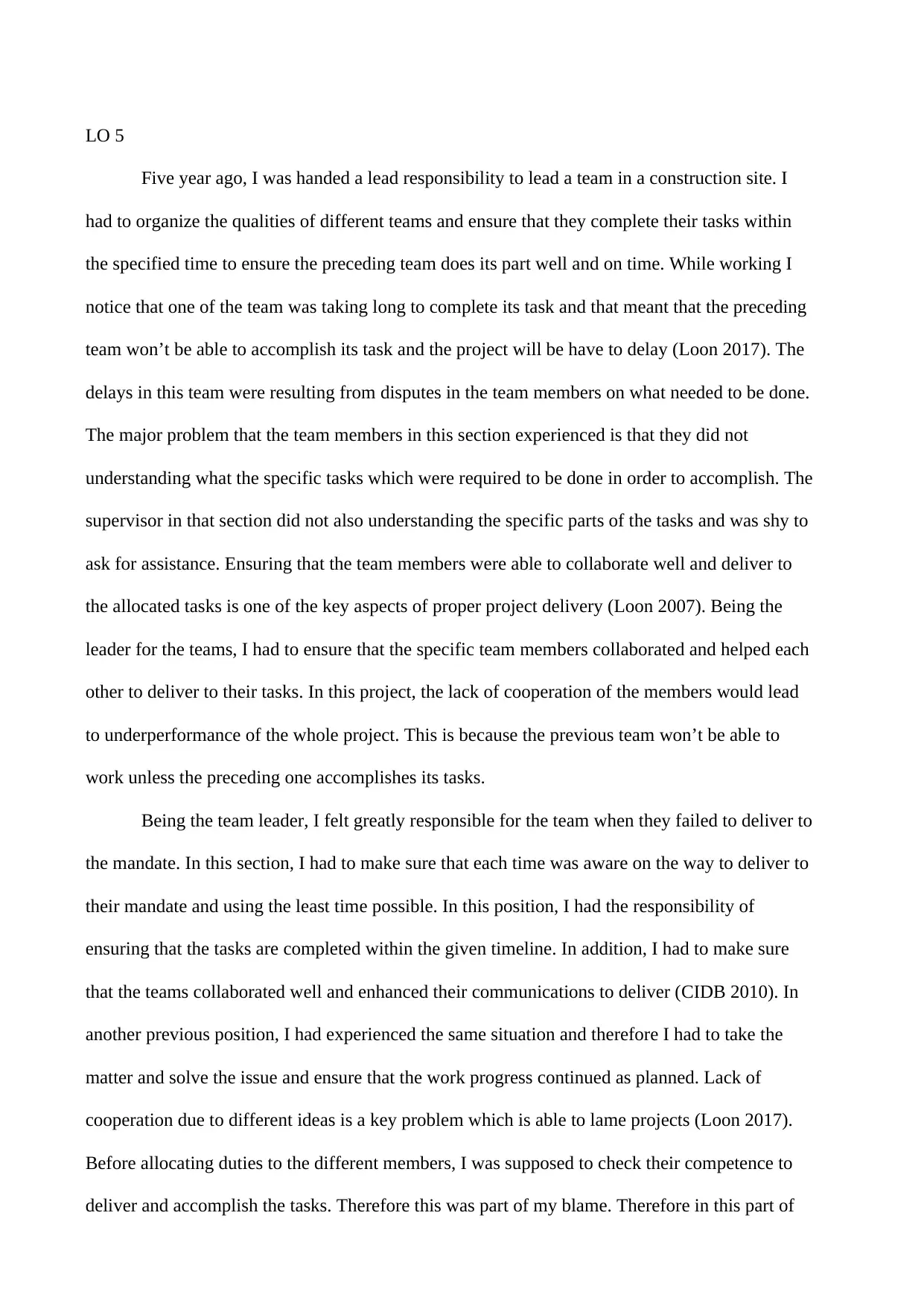
LO 5
Five year ago, I was handed a lead responsibility to lead a team in a construction site. I
had to organize the qualities of different teams and ensure that they complete their tasks within
the specified time to ensure the preceding team does its part well and on time. While working I
notice that one of the team was taking long to complete its task and that meant that the preceding
team won’t be able to accomplish its task and the project will be have to delay (Loon 2017). The
delays in this team were resulting from disputes in the team members on what needed to be done.
The major problem that the team members in this section experienced is that they did not
understanding what the specific tasks which were required to be done in order to accomplish. The
supervisor in that section did not also understanding the specific parts of the tasks and was shy to
ask for assistance. Ensuring that the team members were able to collaborate well and deliver to
the allocated tasks is one of the key aspects of proper project delivery (Loon 2007). Being the
leader for the teams, I had to ensure that the specific team members collaborated and helped each
other to deliver to their tasks. In this project, the lack of cooperation of the members would lead
to underperformance of the whole project. This is because the previous team won’t be able to
work unless the preceding one accomplishes its tasks.
Being the team leader, I felt greatly responsible for the team when they failed to deliver to
the mandate. In this section, I had to make sure that each time was aware on the way to deliver to
their mandate and using the least time possible. In this position, I had the responsibility of
ensuring that the tasks are completed within the given timeline. In addition, I had to make sure
that the teams collaborated well and enhanced their communications to deliver (CIDB 2010). In
another previous position, I had experienced the same situation and therefore I had to take the
matter and solve the issue and ensure that the work progress continued as planned. Lack of
cooperation due to different ideas is a key problem which is able to lame projects (Loon 2017).
Before allocating duties to the different members, I was supposed to check their competence to
deliver and accomplish the tasks. Therefore this was part of my blame. Therefore in this part of
Five year ago, I was handed a lead responsibility to lead a team in a construction site. I
had to organize the qualities of different teams and ensure that they complete their tasks within
the specified time to ensure the preceding team does its part well and on time. While working I
notice that one of the team was taking long to complete its task and that meant that the preceding
team won’t be able to accomplish its task and the project will be have to delay (Loon 2017). The
delays in this team were resulting from disputes in the team members on what needed to be done.
The major problem that the team members in this section experienced is that they did not
understanding what the specific tasks which were required to be done in order to accomplish. The
supervisor in that section did not also understanding the specific parts of the tasks and was shy to
ask for assistance. Ensuring that the team members were able to collaborate well and deliver to
the allocated tasks is one of the key aspects of proper project delivery (Loon 2007). Being the
leader for the teams, I had to ensure that the specific team members collaborated and helped each
other to deliver to their tasks. In this project, the lack of cooperation of the members would lead
to underperformance of the whole project. This is because the previous team won’t be able to
work unless the preceding one accomplishes its tasks.
Being the team leader, I felt greatly responsible for the team when they failed to deliver to
the mandate. In this section, I had to make sure that each time was aware on the way to deliver to
their mandate and using the least time possible. In this position, I had the responsibility of
ensuring that the tasks are completed within the given timeline. In addition, I had to make sure
that the teams collaborated well and enhanced their communications to deliver (CIDB 2010). In
another previous position, I had experienced the same situation and therefore I had to take the
matter and solve the issue and ensure that the work progress continued as planned. Lack of
cooperation due to different ideas is a key problem which is able to lame projects (Loon 2017).
Before allocating duties to the different members, I was supposed to check their competence to
deliver and accomplish the tasks. Therefore this was part of my blame. Therefore in this part of
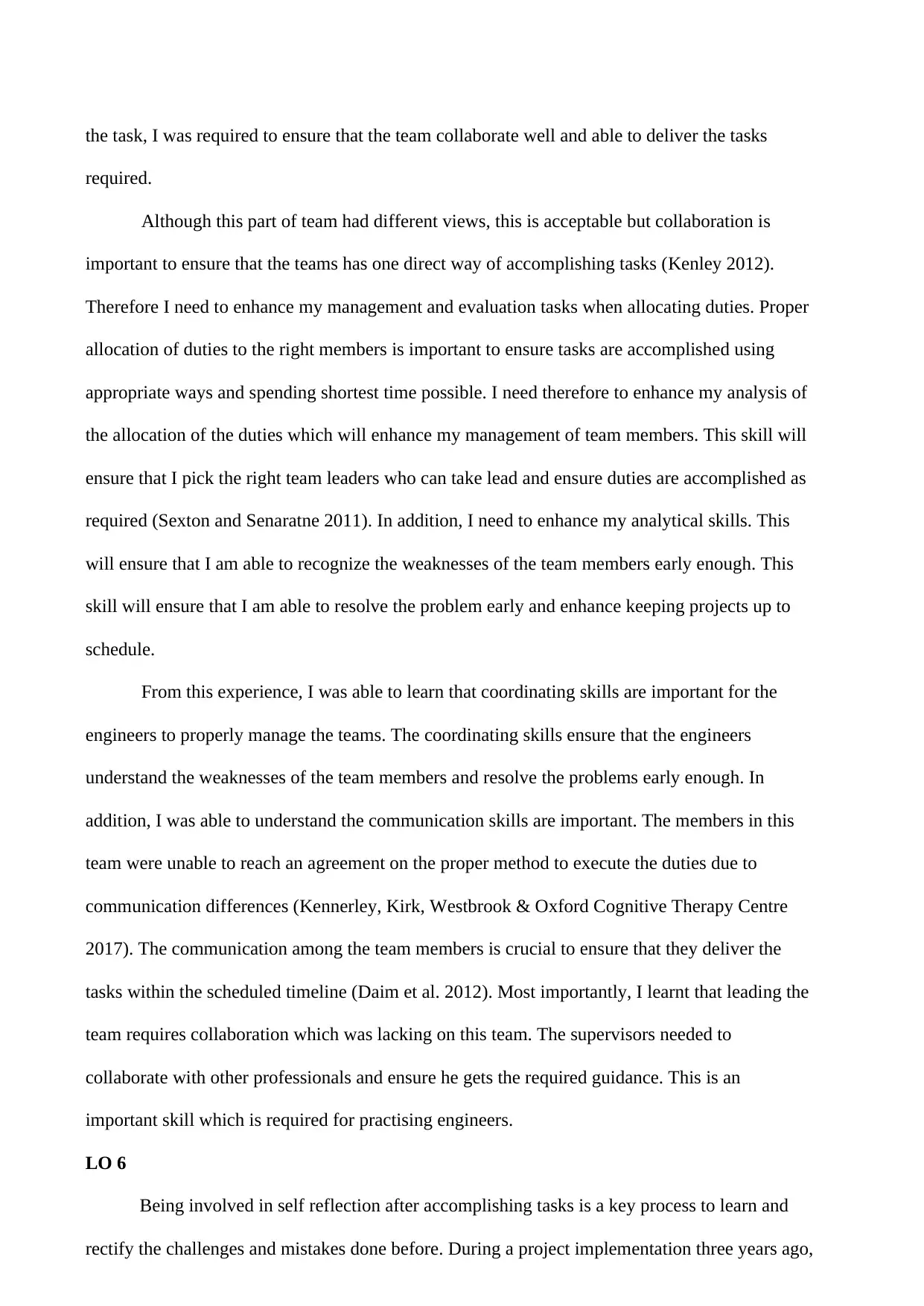
the task, I was required to ensure that the team collaborate well and able to deliver the tasks
required.
Although this part of team had different views, this is acceptable but collaboration is
important to ensure that the teams has one direct way of accomplishing tasks (Kenley 2012).
Therefore I need to enhance my management and evaluation tasks when allocating duties. Proper
allocation of duties to the right members is important to ensure tasks are accomplished using
appropriate ways and spending shortest time possible. I need therefore to enhance my analysis of
the allocation of the duties which will enhance my management of team members. This skill will
ensure that I pick the right team leaders who can take lead and ensure duties are accomplished as
required (Sexton and Senaratne 2011). In addition, I need to enhance my analytical skills. This
will ensure that I am able to recognize the weaknesses of the team members early enough. This
skill will ensure that I am able to resolve the problem early and enhance keeping projects up to
schedule.
From this experience, I was able to learn that coordinating skills are important for the
engineers to properly manage the teams. The coordinating skills ensure that the engineers
understand the weaknesses of the team members and resolve the problems early enough. In
addition, I was able to understand the communication skills are important. The members in this
team were unable to reach an agreement on the proper method to execute the duties due to
communication differences (Kennerley, Kirk, Westbrook & Oxford Cognitive Therapy Centre
2017). The communication among the team members is crucial to ensure that they deliver the
tasks within the scheduled timeline (Daim et al. 2012). Most importantly, I learnt that leading the
team requires collaboration which was lacking on this team. The supervisors needed to
collaborate with other professionals and ensure he gets the required guidance. This is an
important skill which is required for practising engineers.
LO 6
Being involved in self reflection after accomplishing tasks is a key process to learn and
rectify the challenges and mistakes done before. During a project implementation three years ago,
required.
Although this part of team had different views, this is acceptable but collaboration is
important to ensure that the teams has one direct way of accomplishing tasks (Kenley 2012).
Therefore I need to enhance my management and evaluation tasks when allocating duties. Proper
allocation of duties to the right members is important to ensure tasks are accomplished using
appropriate ways and spending shortest time possible. I need therefore to enhance my analysis of
the allocation of the duties which will enhance my management of team members. This skill will
ensure that I pick the right team leaders who can take lead and ensure duties are accomplished as
required (Sexton and Senaratne 2011). In addition, I need to enhance my analytical skills. This
will ensure that I am able to recognize the weaknesses of the team members early enough. This
skill will ensure that I am able to resolve the problem early and enhance keeping projects up to
schedule.
From this experience, I was able to learn that coordinating skills are important for the
engineers to properly manage the teams. The coordinating skills ensure that the engineers
understand the weaknesses of the team members and resolve the problems early enough. In
addition, I was able to understand the communication skills are important. The members in this
team were unable to reach an agreement on the proper method to execute the duties due to
communication differences (Kennerley, Kirk, Westbrook & Oxford Cognitive Therapy Centre
2017). The communication among the team members is crucial to ensure that they deliver the
tasks within the scheduled timeline (Daim et al. 2012). Most importantly, I learnt that leading the
team requires collaboration which was lacking on this team. The supervisors needed to
collaborate with other professionals and ensure he gets the required guidance. This is an
important skill which is required for practising engineers.
LO 6
Being involved in self reflection after accomplishing tasks is a key process to learn and
rectify the challenges and mistakes done before. During a project implementation three years ago,
⊘ This is a preview!⊘
Do you want full access?
Subscribe today to unlock all pages.

Trusted by 1+ million students worldwide
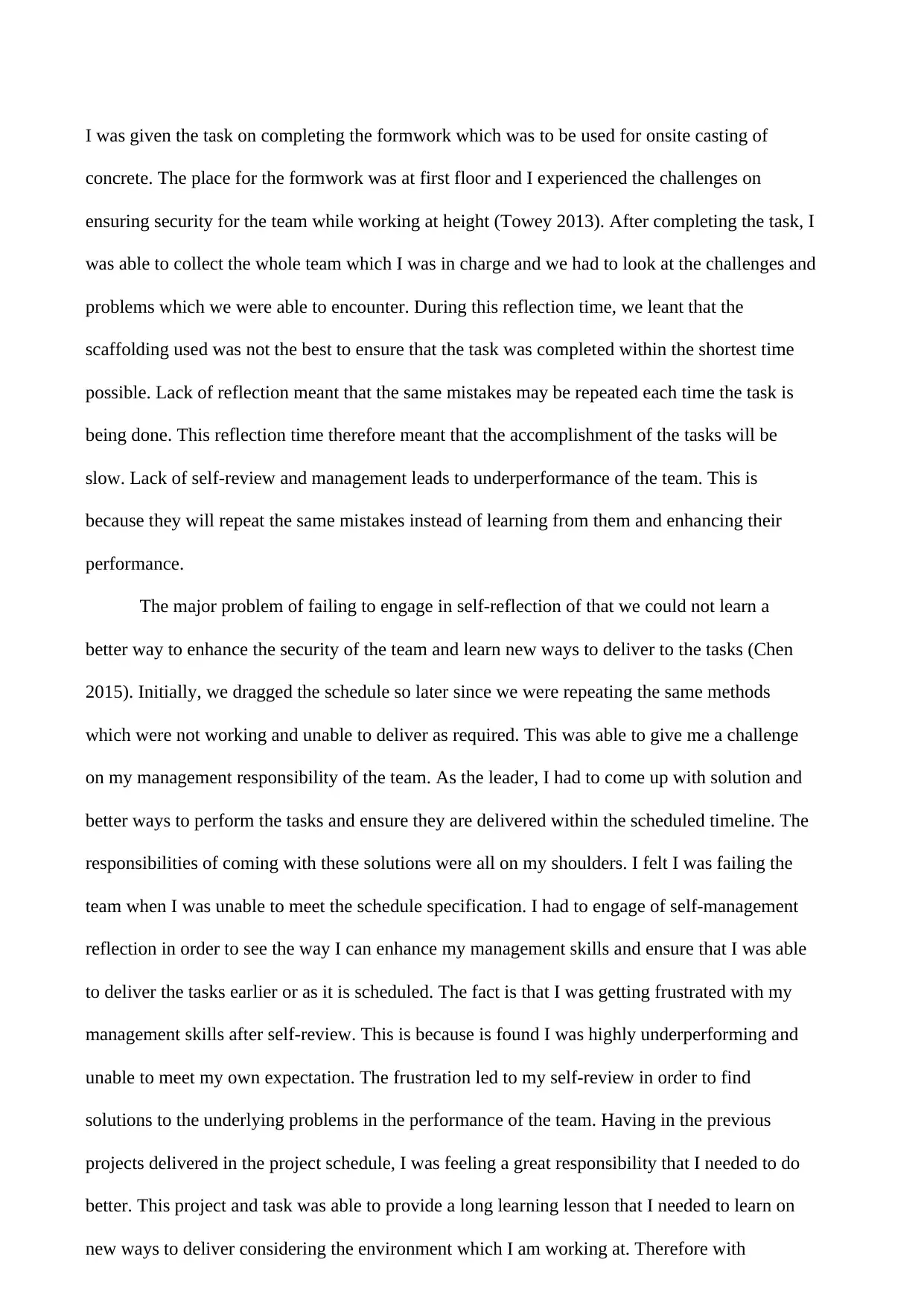
I was given the task on completing the formwork which was to be used for onsite casting of
concrete. The place for the formwork was at first floor and I experienced the challenges on
ensuring security for the team while working at height (Towey 2013). After completing the task, I
was able to collect the whole team which I was in charge and we had to look at the challenges and
problems which we were able to encounter. During this reflection time, we leant that the
scaffolding used was not the best to ensure that the task was completed within the shortest time
possible. Lack of reflection meant that the same mistakes may be repeated each time the task is
being done. This reflection time therefore meant that the accomplishment of the tasks will be
slow. Lack of self-review and management leads to underperformance of the team. This is
because they will repeat the same mistakes instead of learning from them and enhancing their
performance.
The major problem of failing to engage in self-reflection of that we could not learn a
better way to enhance the security of the team and learn new ways to deliver to the tasks (Chen
2015). Initially, we dragged the schedule so later since we were repeating the same methods
which were not working and unable to deliver as required. This was able to give me a challenge
on my management responsibility of the team. As the leader, I had to come up with solution and
better ways to perform the tasks and ensure they are delivered within the scheduled timeline. The
responsibilities of coming with these solutions were all on my shoulders. I felt I was failing the
team when I was unable to meet the schedule specification. I had to engage of self-management
reflection in order to see the way I can enhance my management skills and ensure that I was able
to deliver the tasks earlier or as it is scheduled. The fact is that I was getting frustrated with my
management skills after self-review. This is because is found I was highly underperforming and
unable to meet my own expectation. The frustration led to my self-review in order to find
solutions to the underlying problems in the performance of the team. Having in the previous
projects delivered in the project schedule, I was feeling a great responsibility that I needed to do
better. This project and task was able to provide a long learning lesson that I needed to learn on
new ways to deliver considering the environment which I am working at. Therefore with
concrete. The place for the formwork was at first floor and I experienced the challenges on
ensuring security for the team while working at height (Towey 2013). After completing the task, I
was able to collect the whole team which I was in charge and we had to look at the challenges and
problems which we were able to encounter. During this reflection time, we leant that the
scaffolding used was not the best to ensure that the task was completed within the shortest time
possible. Lack of reflection meant that the same mistakes may be repeated each time the task is
being done. This reflection time therefore meant that the accomplishment of the tasks will be
slow. Lack of self-review and management leads to underperformance of the team. This is
because they will repeat the same mistakes instead of learning from them and enhancing their
performance.
The major problem of failing to engage in self-reflection of that we could not learn a
better way to enhance the security of the team and learn new ways to deliver to the tasks (Chen
2015). Initially, we dragged the schedule so later since we were repeating the same methods
which were not working and unable to deliver as required. This was able to give me a challenge
on my management responsibility of the team. As the leader, I had to come up with solution and
better ways to perform the tasks and ensure they are delivered within the scheduled timeline. The
responsibilities of coming with these solutions were all on my shoulders. I felt I was failing the
team when I was unable to meet the schedule specification. I had to engage of self-management
reflection in order to see the way I can enhance my management skills and ensure that I was able
to deliver the tasks earlier or as it is scheduled. The fact is that I was getting frustrated with my
management skills after self-review. This is because is found I was highly underperforming and
unable to meet my own expectation. The frustration led to my self-review in order to find
solutions to the underlying problems in the performance of the team. Having in the previous
projects delivered in the project schedule, I was feeling a great responsibility that I needed to do
better. This project and task was able to provide a long learning lesson that I needed to learn on
new ways to deliver considering the environment which I am working at. Therefore with
Paraphrase This Document
Need a fresh take? Get an instant paraphrase of this document with our AI Paraphraser
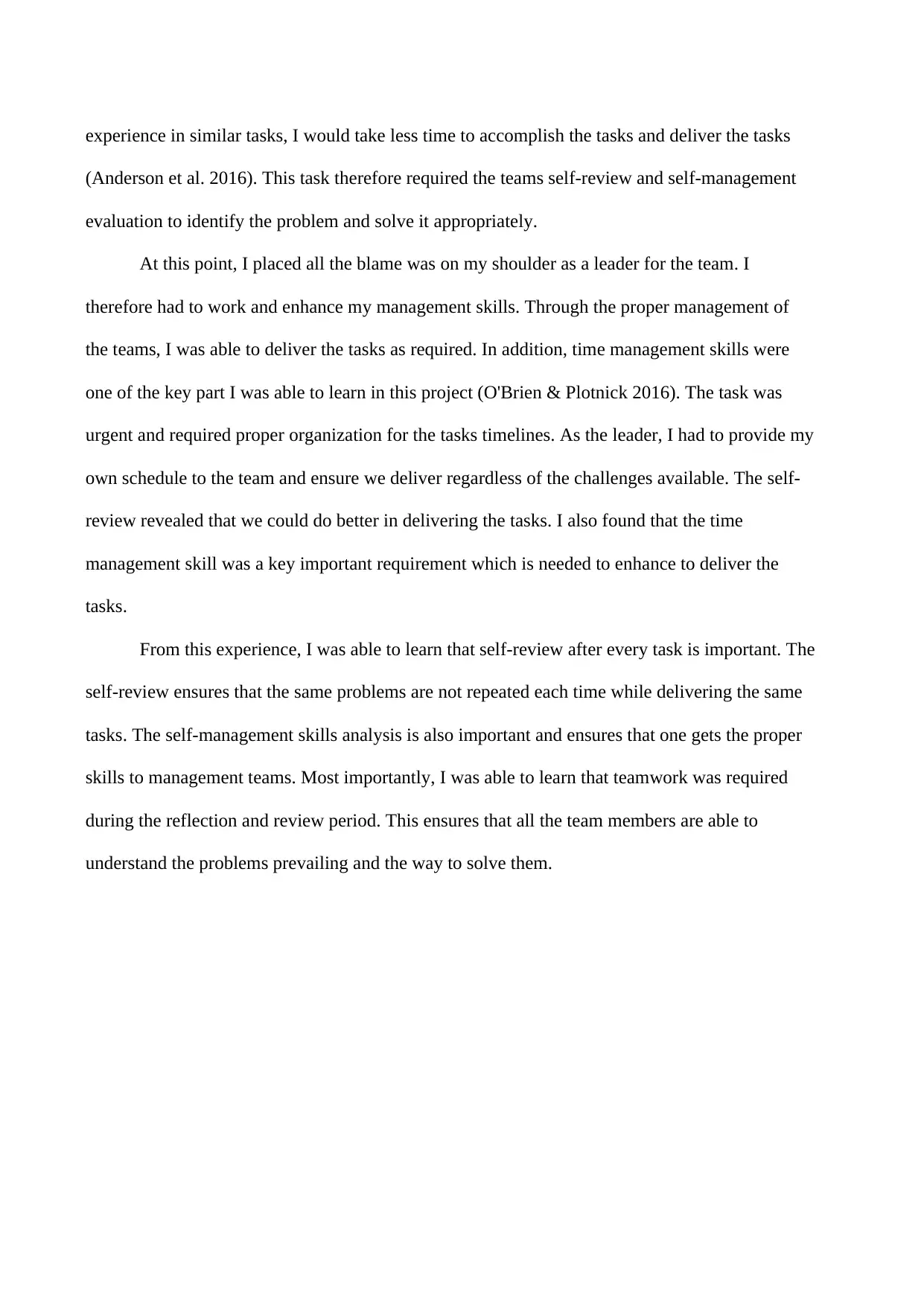
experience in similar tasks, I would take less time to accomplish the tasks and deliver the tasks
(Anderson et al. 2016). This task therefore required the teams self-review and self-management
evaluation to identify the problem and solve it appropriately.
At this point, I placed all the blame was on my shoulder as a leader for the team. I
therefore had to work and enhance my management skills. Through the proper management of
the teams, I was able to deliver the tasks as required. In addition, time management skills were
one of the key part I was able to learn in this project (O'Brien & Plotnick 2016). The task was
urgent and required proper organization for the tasks timelines. As the leader, I had to provide my
own schedule to the team and ensure we deliver regardless of the challenges available. The self-
review revealed that we could do better in delivering the tasks. I also found that the time
management skill was a key important requirement which is needed to enhance to deliver the
tasks.
From this experience, I was able to learn that self-review after every task is important. The
self-review ensures that the same problems are not repeated each time while delivering the same
tasks. The self-management skills analysis is also important and ensures that one gets the proper
skills to management teams. Most importantly, I was able to learn that teamwork was required
during the reflection and review period. This ensures that all the team members are able to
understand the problems prevailing and the way to solve them.
(Anderson et al. 2016). This task therefore required the teams self-review and self-management
evaluation to identify the problem and solve it appropriately.
At this point, I placed all the blame was on my shoulder as a leader for the team. I
therefore had to work and enhance my management skills. Through the proper management of
the teams, I was able to deliver the tasks as required. In addition, time management skills were
one of the key part I was able to learn in this project (O'Brien & Plotnick 2016). The task was
urgent and required proper organization for the tasks timelines. As the leader, I had to provide my
own schedule to the team and ensure we deliver regardless of the challenges available. The self-
review revealed that we could do better in delivering the tasks. I also found that the time
management skill was a key important requirement which is needed to enhance to deliver the
tasks.
From this experience, I was able to learn that self-review after every task is important. The
self-review ensures that the same problems are not repeated each time while delivering the same
tasks. The self-management skills analysis is also important and ensures that one gets the proper
skills to management teams. Most importantly, I was able to learn that teamwork was required
during the reflection and review period. This ensures that all the team members are able to
understand the problems prevailing and the way to solve them.
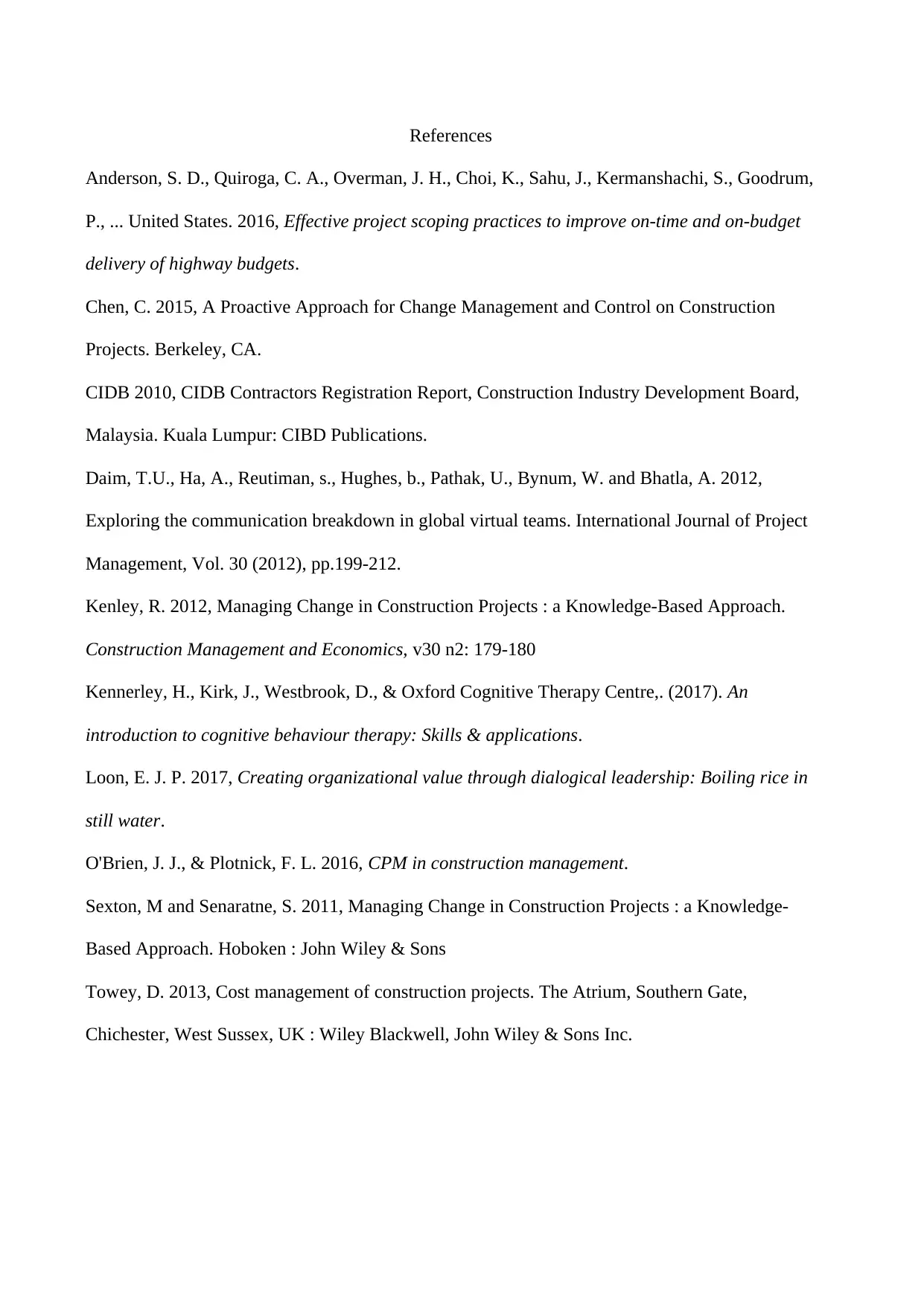
References
Anderson, S. D., Quiroga, C. A., Overman, J. H., Choi, K., Sahu, J., Kermanshachi, S., Goodrum,
P., ... United States. 2016, Effective project scoping practices to improve on-time and on-budget
delivery of highway budgets.
Chen, C. 2015, A Proactive Approach for Change Management and Control on Construction
Projects. Berkeley, CA.
CIDB 2010, CIDB Contractors Registration Report, Construction Industry Development Board,
Malaysia. Kuala Lumpur: CIBD Publications.
Daim, T.U., Ha, A., Reutiman, s., Hughes, b., Pathak, U., Bynum, W. and Bhatla, A. 2012,
Exploring the communication breakdown in global virtual teams. International Journal of Project
Management, Vol. 30 (2012), pp.199-212.
Kenley, R. 2012, Managing Change in Construction Projects : a Knowledge-Based Approach.
Construction Management and Economics, v30 n2: 179-180
Kennerley, H., Kirk, J., Westbrook, D., & Oxford Cognitive Therapy Centre,. (2017). An
introduction to cognitive behaviour therapy: Skills & applications.
Loon, E. J. P. 2017, Creating organizational value through dialogical leadership: Boiling rice in
still water.
O'Brien, J. J., & Plotnick, F. L. 2016, CPM in construction management.
Sexton, M and Senaratne, S. 2011, Managing Change in Construction Projects : a Knowledge-
Based Approach. Hoboken : John Wiley & Sons
Towey, D. 2013, Cost management of construction projects. The Atrium, Southern Gate,
Chichester, West Sussex, UK : Wiley Blackwell, John Wiley & Sons Inc.
Anderson, S. D., Quiroga, C. A., Overman, J. H., Choi, K., Sahu, J., Kermanshachi, S., Goodrum,
P., ... United States. 2016, Effective project scoping practices to improve on-time and on-budget
delivery of highway budgets.
Chen, C. 2015, A Proactive Approach for Change Management and Control on Construction
Projects. Berkeley, CA.
CIDB 2010, CIDB Contractors Registration Report, Construction Industry Development Board,
Malaysia. Kuala Lumpur: CIBD Publications.
Daim, T.U., Ha, A., Reutiman, s., Hughes, b., Pathak, U., Bynum, W. and Bhatla, A. 2012,
Exploring the communication breakdown in global virtual teams. International Journal of Project
Management, Vol. 30 (2012), pp.199-212.
Kenley, R. 2012, Managing Change in Construction Projects : a Knowledge-Based Approach.
Construction Management and Economics, v30 n2: 179-180
Kennerley, H., Kirk, J., Westbrook, D., & Oxford Cognitive Therapy Centre,. (2017). An
introduction to cognitive behaviour therapy: Skills & applications.
Loon, E. J. P. 2017, Creating organizational value through dialogical leadership: Boiling rice in
still water.
O'Brien, J. J., & Plotnick, F. L. 2016, CPM in construction management.
Sexton, M and Senaratne, S. 2011, Managing Change in Construction Projects : a Knowledge-
Based Approach. Hoboken : John Wiley & Sons
Towey, D. 2013, Cost management of construction projects. The Atrium, Southern Gate,
Chichester, West Sussex, UK : Wiley Blackwell, John Wiley & Sons Inc.
⊘ This is a preview!⊘
Do you want full access?
Subscribe today to unlock all pages.

Trusted by 1+ million students worldwide
1 out of 6
Related Documents
Your All-in-One AI-Powered Toolkit for Academic Success.
+13062052269
info@desklib.com
Available 24*7 on WhatsApp / Email
![[object Object]](/_next/static/media/star-bottom.7253800d.svg)
Unlock your academic potential
Copyright © 2020–2026 A2Z Services. All Rights Reserved. Developed and managed by ZUCOL.





